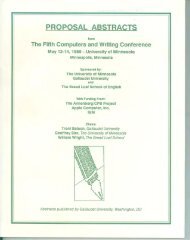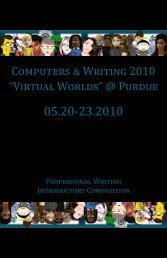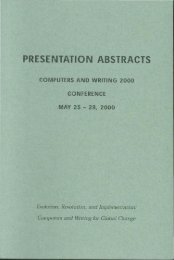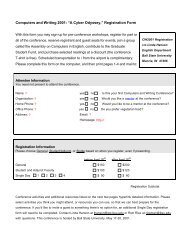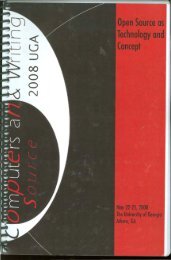CW2001 Program - Computers and Writing
CW2001 Program - Computers and Writing
CW2001 Program - Computers and Writing
Create successful ePaper yourself
Turn your PDF publications into a flip-book with our unique Google optimized e-Paper software.
Friday<br />
9:45 — 11:00 Session A.6<br />
Design Issues in Distance Education<br />
RB 292<br />
Keith Dorwick, moderator<br />
Anne Bliss<br />
Course Structures for the Web<br />
This presenter has developed several online courses <strong>and</strong> has found<br />
that a modular structure for lessons enables community building, use<br />
of a variety of teaching techniques, flexible planning <strong>and</strong> delivery,<br />
<strong>and</strong> means for students to adapt the materials to their individual<br />
learning styles.<br />
Stuart Blythe<br />
What Do We Mean by “Design” A Critique of Development Models<br />
for Distance Learning<br />
In this presentation, I differentiate between the variety of practices<br />
denoted by design <strong>and</strong> consider how those practices apply to distance<br />
learning. I illustrate the general value of user-centered design strategies<br />
while acknowledging the difficulties of adapting such strategies to the<br />
development of distance learning resources.<br />
Rick Branscomb<br />
A Various Language: Knowledge, Online Learning, <strong>and</strong> Harcourt<br />
College<br />
If the Web <strong>and</strong> its prestigious educational tools such as WebCT have<br />
the capability of both content distribution <strong>and</strong> collaborative learning,<br />
why can’t these models of learning coexist on the Web The answer<br />
is the convergence of two forces: the market force <strong>and</strong> the political<br />
force. These forces come together <strong>and</strong> threaten constructivist virtual<br />
education, <strong>and</strong> I assert that teachers must take action to overcome<br />
the stasis in knowledge that will follow.<br />
Temi Rose<br />
Designing Online Learning that Supports a Psychology of Becoming<br />
Hyperactive rates of change in information technology are an open<br />
invitation to educators to become actively involved in the design of<br />
electronic learning systems. As consumers, we already participate in<br />
the creation of technology education models. As designers in our<br />
classrooms, our distance education projects, <strong>and</strong> on the WWW, our<br />
creativity becomes part of the paradigm, the co-construction of<br />
electronic education.<br />
28 <strong>Computers</strong> & <strong>Writing</strong> 2001



